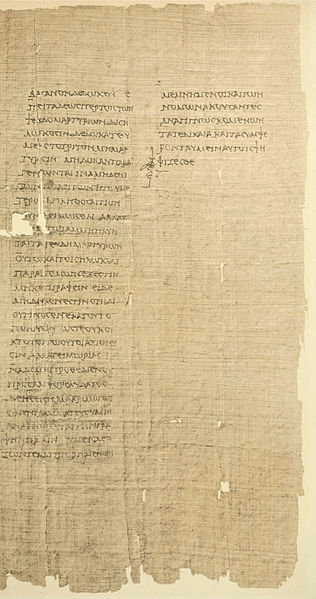Hypereides or Hyperides was an Athenian logographer. He was one of the ten Attic orators included in the "Alexandrian canon" compiled by Aristophanes of Byzantium and Aristarchus of Samothrace in the third century BC.
Hypereides
The final two columns of P.Lit.Lond. 134, the 2nd-century BC papyrus that transmits the conclusion to Against Philippides
Jean-Léon Gérôme, Phryne before the Areopagus, 1861
Demosthenes was a Greek statesman and orator in ancient Athens. His orations constitute a significant expression of contemporary Athenian intellectual prowess and provide insight into the politics and culture of ancient Greece during the 4th century BC. Demosthenes learned rhetoric by studying the speeches of previous great orators. He delivered his first judicial speeches at the age of 20, in which he successfully argued that he should gain from his guardians what was left of his inheritance. For a time, Demosthenes made his living as a professional speechwriter (logographer) and a lawyer, writing speeches for use in private legal suits.
Bust of Demosthenes (Louvre, Paris, France)
Bust of Demosthenes (British Museum, London), Roman copy of a Greek original sculpted by Polyeuktos.
Demosthenes Practising Oratory by Jean-Jules-Antoine Lecomte du Nouy (1842–1923). Demosthenes used to study in an underground room he constructed himself. He also used to talk with pebbles in his mouth and recited verses while running. To strengthen his voice, he spoke on the seashore over the roar of the waves.
Illustration by Walter Crane of Demosthenes leaving the Assembly in shame after his first failure at public speaking, as described by Plutarch in his Life of Demosthenes







